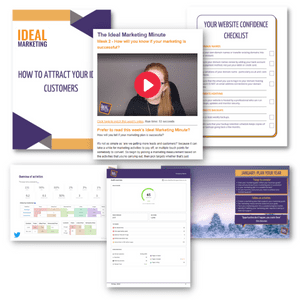Do estate agents still need websites now there are online real estate portals?
Has the exponential growth of online real estate portals such as Rightmove, Zoopla and On the Market over the past few years spelled the demise of high street estate agents?
Rightmove for example claims to be “the UK’s no 1 property website”. So where does that leave the high street estate agent? And is there any point in an offline estate agent having an online presence?
Now more than ever, is the time for high street agents to improve their online presence, in order to differentiate their offering to customers. And in this article, we outline precisely how to do that.
What are real estate portals?
Real estate – or property – portals aim to gather together properties available to let and buy in one place online.
The intention is to make it easier for buyers – or those interested in renting – to view a property in detail, without having to visit the actual site itself. Which can suit someone looking for property some distance from their own location, as well as someone looking to buy locally, who just wants to know what’s out there and available.
This method of browsing better reflects how we like to shop in this digital age. We do our research online in the first instance. Across many websites. And with a big ticket item such as a house purchase, this is very unlikely to be an impulse buy.
How can high street estate agents differentiate themselves online?
There is little doubt that property portals are here to stay. And with their big budget marketing spend, they offer great reach. So the question remains, how can estate agents differentiate themselves and their offering to ensure that prospective buyers, tenants, landlords and vendors come flocking?
Build a responsive, easy to navigate and well optimised website
Not all websites are alike! And those built from the ground up, focusing on the customer and how they ‘shop’ your site inevitably do far better than those just keen on telling you how many hundreds of properties they have on their books.
The user experience is paramount and Google is clearer and clearer about what makes a good website. You ignore this at your peril.
Firstly consider who your customers are – who you have already – and who you might also want to attract. Condense them into 4 or 5 well developed personas and then keep them at the forefront of the design process.
Research how those personas use your site at present. There’s a good reason behind why Google is promoting the message of ‘mobile first’– increasingly, more and more of us start a search on a mobile device. So make sure your website is responsive: able to be viewed easily on any device, with its focus on a journey driven design.
Incorporate the best website search and filter functionality
Think how your customers are most likely to shop your website. Whether they are looking for somewhere to rent or to buy, there is nothing more off putting than clumsy search functionality, that prevents them finding their ideal property, because it doesn’t allow them to be specific enough in their search, resulting in hundreds of properties being returned for them to trawl through – and no way of filtering them.
For example, have you segmented your portfolio by property type? By price (ascending and descending order)? By property features, such as off road parking; ground floor accommodation; concierge services; shops nearby; enclosed garden etc.
The more of these property features you can think of and add to your website, the more likely a property is to be returned in a search.
Search and filter functionality are critical to this type of website and something portals will have put huge time and investment in. So understand what works and include it in your own website design from the outset.
Include great photography alongside unique and relevant website copy
A picture paints a thousand words, right? So why do we so often see average to poor images, that do very little to sell a property? Unmade beds, poor lighting and exterior shots with someone else’s car on the drive turn potential buyers and tenants off. And gardens covered in snow won’t help a property that is still being marketed in the summer.
By contrast, professional photography, with the right lighting and room dressing can very quickly persuade someone to contact you for a viewing. So make sure you invest in good photography at the early stage of marketing a property. If the property has a real fire, then light it and photograph it.
Unique and relevant copy is just as important. It’s your chance to really differentiate your listing and stand apart from those who simply write ‘2 bed city centre apartment with parking’.
By using copy that is optimised for the kind of words that you know customers search for, you will greatly increase the chances of being found online.
Make sure you install Google Analytics in any website build
A well designed website is critical – but knowing how it performs is just as important. Installing Google Analytics will not only let you monitor your web traffic, it will also enable you to drill down into huge detail about where your traffic is coming from, how long users stay on key pages and what they do whilst they’re there. Used properly, it should then inform your strategy for developing your website and copy writing going forward.
Prioritise search engine optimisation
Whilst the portals will inevitably dominate the market for certain keywords, it doesn’t mean it isn’t worth you investing in improving your ability to be found online, especially if you operate within a certain geographical area (rather than the UK as a whole).
Once a website has been built, if technical on-page SEO basics such as meta data, alt tags and H1 and H2 tags are put into place, this will form the basis to making a difference to you being found on Google.
Once that is done, the focus should be on generating more copy, whether through keeping pages refreshed with unique content or writing regular blogs.
By conducting a keyword search, you can then find out what terms users are entering into search engines in order to find you or your competitors. And that should drive your content strategy.
Incorporate third party feedback
There’s nothing like a third party review to help inform a potential customer in their decision making about a purchase. It’s one thing you listing all the good reviews you’ve ever had. And quite another signing up to a third party system that gives a more impartial overview. Examples include Trustpilot or Reviews.co.uk. There’s even one for estate agents; raterAgent.
Differentiate your customer service
When do most of your customers search your site? If you don’t already know this, then it’s worth finding out.
The chances are it’s not always during your normal office hours. So if a customer has a question, then email might be their only option to get an answer. Does your business have a clear policy about how quickly you get back to them?
Fortunately, in this digital age, there are alternatives out there, including live online customer service software such as ‘LiveChat’ which enable customers to get an immediate answer to their questions, simultaneously reducing the load on phone calls and emails.
And one additional benefit is the opportunity to run this software after office hours, even from a mobile device, capturing traffic you might otherwise miss during the day.
Portals advertise properties; estate agents close the deal
In summary, it’s worth remembering that Rightmove and their ilk don’t sell houses – they advertise them.
At the end of the day, it is estate agents that handle the call, run the checks, conduct the viewings and ultimately close the deal. Sell the house. Rent the flat. Or advise on the land purchase.
Understand the important differences between a real estate portal and an estate agent – and make sure you call these out in your marketing.
Contact The Ideal Marketing Company for all your digital marketing requirements
Want to learn more?
The Ideal Marketing Company is a full service digital marketing agency. Contact us for more tailored advice about how The Ideal Marketing Company can help you grow your business.







